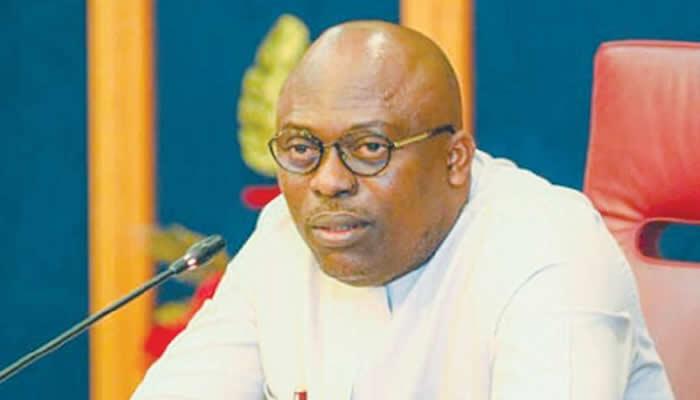The political landscape of Rivers State, Nigeria’s oil-rich South-South region, remains embroiled in a high-stakes power struggle that has captivated the nation. At the heart of the crisis is the suspended Governor Siminalayi Fubara, whose resolve to continue serving the people of Rivers State has become a rallying point for his supporters, even as he faces formidable opposition from his former political mentor, Nyesom Wike, now the Minister of the Federal Capital Territory (FCT). The ongoing feud, which has paralyzed governance and sparked protests, legal battles, and a state of emergency, shows no signs of abating, with recent developments adding fresh layers of intrigue to this complex saga.
The Roots of the Crisis
The political turmoil in Rivers State traces back to October 2023, when tensions between Fubara and Wike, his predecessor, erupted into a public feud. Wike, who served as Rivers State Governor from 2015 to 2023, played a pivotal role in Fubara’s rise to power, effectively handpicking him as his successor in the 2023 general elections under the People’s Democratic Party (PDP). However, the mentor-protégé relationship quickly soured, with Fubara asserting his independence and Wike seeking to maintain influence over the state’s political machinery. This clash of egos has fueled a bitter rivalry, dividing the state’s political class and plunging Rivers into a state of near-constant unrest.
The crisis escalated dramatically in December 2023 when Fubara ordered the demolition of the Rivers State House of Assembly complex, citing structural concerns after a fire. This move was widely perceived as an attempt to neutralize the legislature, which was dominated by lawmakers loyal to Wike. In retaliation, 27 pro-Wike lawmakers defected from the PDP to the All Progressives Congress (APC), triggering a legal and political firestorm. Fubara’s administration declared their seats vacant, but the Supreme Court, in a landmark ruling in February 2025, reinstated the defected lawmakers, condemning Fubara’s actions as unconstitutional.
The situation reached a boiling point on March 18, 2025, when President Bola Ahmed Tinubu declared a state of emergency in Rivers State, citing political instability and a series of explosions targeting the Trans Niger Pipeline and other infrastructure, which he linked to militants allegedly aligned with Fubara. The declaration led to the suspension of Fubara, his deputy, Ngozi Odu, and the entire Rivers State House of Assembly for six months. Former Navy Chief Vice-Admiral Ibok-Ete Ekwe Ibas was appointed as the sole administrator to oversee the state during this period.
The state of emergency was a polarizing move. Critics, including former Rivers State Governor Rotimi Amaechi, labeled it unconstitutional, arguing that it undermined democratic processes. Meanwhile, Fubara’s supporters, including the state’s Commissioner for Youth, Chisom Gbali, accused Wike and his allies of orchestrating disruptions to justify extending the emergency rule. Gbali claimed that Wike’s camp was behind efforts to destabilize Fubara’s administration, pointing to the former governor’s influence over the state’s political and security apparatus.
Fubara, however, has remained steadfast. In a statement issued on March 31, 2025, through his Chief Press Secretary, he reassured Rivers residents that the crisis would ultimately strengthen the state. “We will emerge stronger,” he declared, urging his supporters to remain calm and avoid violence instigated by those seeking to exploit the situation. His commitment to justice and inclusivity has won him significant grassroots support, particularly among minority communities like the Muslim population, who have praised his inclusive governance compared to Wike’s administration, which declared Rivers a “100% Christian state.”
Recent developments suggest tentative moves toward reconciliation, though tensions remain high. In April 2025, Fubara initiated a private meeting with President Tinubu in London during the president’s 18-day retreat in Europe. Accompanied by two other governors, Fubara sought to ease political tensions, raising hopes among some stakeholders that his suspension might be lifted before its September 2025 expiration. However, Wike, who was not included in the meeting, reportedly expressed displeasure at being sidelined, underscoring the fragility of any potential truce.
Wike, for his part, has publicly maintained that Fubara remains his “political son,” despite their rift. In a media parley on May 17, 2025, he claimed that Fubara had apologized and made reconciliatory moves, including a visit with two other governors. Yet, Wike also accused Fubara of organizing protests against the state of emergency, suggesting that the suspended governor’s actions lacked sincerity. Wike’s earlier statements in April 2025 revealed his preference for Fubara’s outright removal rather than the emergency rule, a stance that has drawn criticism from Fubara’s camp, who argue that Wike is the primary instigator of the crisis.
Adding fuel to the fire, a controversial statement by Udengs Eradiri, the 2023 Bayelsa State gubernatorial candidate for the Labour Party, urged Fubara to “kneel and beg” Wike for forgiveness, accusing the governor of incompetence and failing to empower the Ijaw community. This sparked outrage among Fubara’s supporters, who view such calls as an attempt to humiliate the governor and perpetuate Wike’s dominance.
The crisis has galvanized public sentiment in Rivers State, with pro-Fubara protests erupting across Port Harcourt. On April 22, 2025, hundreds of supporters clad in black and carrying placards with messages like “Together we stand for Governor Sim Fubara” and “We want back our Governor” took to the streets, demanding his reinstatement. These demonstrations reflect Fubara’s strong grassroots support, particularly among those who see him as a victim of Wike’s overreach. However, counter-protests and allegations of politically motivated violence have further polarized the state.
Social media platforms, particularly X, have been abuzz with commentary on the crisis. Posts on May 18, 2025, speculated that Fubara might join the APC, aligning with Tinubu’s political machine ahead of the 2027 elections—a claim that remains unverified but highlights the intense political maneuvering at play.
The Rivers State House of Assembly, led by Speaker Martin Amaewhule, has been a key battleground. On March 14, 2025, 26 pro-Wike lawmakers filed a notice of impeachment against Fubara and his deputy, accusing them of gross misconduct and undermining the legislature. The move was seen as a direct response to Fubara’s attempt to present the 2025 budget to the Assembly, which he was denied access to on March 12, 2025, despite notifying the Speaker in advance. The Supreme Court’s February 2025 ruling, which upheld the legitimacy of the pro-Wike lawmakers, has emboldened their efforts to unseat Fubara, with some predicting that Speaker Amaewhule could assume the role of acting governor by mid-July if the impeachment succeeds.
Fubara’s administration has fought back through legal channels. In December 2023, a State High Court in Port Harcourt cleared the way for a four-member pro-Fubara Assembly faction to conduct legislative business, though this was later overturned by the Supreme Court. Fubara has also appealed to the Supreme Court to challenge the reinstatement of the defected lawmakers, arguing that their defection violated constitutional provisions. These legal battles have further stalled governance, leaving Rivers State in a state of administrative limbo.
As the September 2025 deadline for the end of Fubara’s suspension approaches, the political future of Rivers State hangs in the balance. Fubara’s supporters remain hopeful that his meeting with Tinubu signals a path to reinstatement, but Wike’s influence and the pro-Wike lawmakers’ determination to impeach him pose significant hurdles. The state of emergency, while intended to restore order, has been criticized for escalating tensions, with fears of increased militant activity and inter-gang violence in the oil-rich region.
Fubara’s resilience and appeal to the people have kept him relevant, but his ability to navigate this crisis will depend on his capacity to build bridges with key stakeholders, including the federal government and moderate elements within Wike’s camp. For now, the people of Rivers State watch anxiously as their state remains a battleground for political supremacy, with the outcome likely to shape Nigeria’s broader political landscape ahead of the 2027 elections.
For updates on this developing story, stay tuned to our platform as we continue to monitor the situation in Rivers State.
Join our Whatsapp channel to stay updated always!



cse1xc